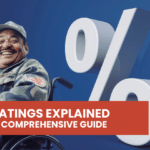Facing challenges with your VA disability claim can be disheartening, whether it’s a denial or a rating that doesn’t truly reflect your condition.
If you’re in this situation, it’s important to know you have the right to appeal.
This guide is designed to simplify the VA disability appeals process, offering a clear path forward for veterans seeking to contest VA decisions.
Understanding VA Disability Benefits
VA disability benefits are monthly payments for veterans who have illnesses or injuries linked to their military service.
However, the path to securing these benefits isn’t always straightforward.
You may encounter hurdles, such as claim denials or receiving a lower disability compensation than anticipated.
While this can be frustrating, there’s a structured appeals process available to challenge these decisions.
Starting Your VA Disability Appeal
When your claim doesn’t go as expected, the first step is understanding the VA’s decision.
This begins with carefully reviewing the decision letter sent by the VA, which details their reasons.
If you disagree, it’s time to file an appeal.
Were You Denied Benefits?
Your Time is as Important as Your Claim
Your moments are precious.
Don’t waste them on legal complexities trying to fight an appeal.
Get your free case evaluation with us today.
Why Claims Get Denied
Common reasons for claim denials include:
- Insufficient proof of the illness or injury’s connection to military service.
- A lack of medical evidence.
Choosing Your Appeal Path
The VA appeals modernization process, introduced in 2019 streamlines the appeals process, offering three main avenues for veterans
The different paths are as follows:
- Higher-Level Review: A senior VA official re-examines your claim.
- Supplemental Claim: You can submit new evidence that wasn’t included in your initial claim.
- Board Appeal: Your appeal is reviewed by a Veterans Law Judge at the Board of Veterans’ Appeals. A veteran can choose to submit new evidence, have a direct review of the existing evidence with no new evidence, or ask for a hearing at the Board.
Each pathway is designed to address different aspects of the appeals process, whether you’re submitting new evidence or seeking a fresh review of your claim.
Filing Your Appeal
The process begins with completing the appropriate appeal form.
For a higher-level review or supplemental appeals, the veteran files the appropriate Decision Review Request, VA Forms 20-0995 or 20-0996.
For a Board appeal, the veteran files a Notice of Disagreement.
These appeal forms are formal documents where you outline your disputes with the VA’s decision.
Precision in detailing your disagreements and the evidence to support your case is crucial.
After submitting your appeal form, patience is key.
The VA’s review process can be lengthy, but understanding and preparing for this timeline is crucial for maintaining focus on your appeal.
After Your Appeal Submission
Once your appeal is submitted, staying updated on its status is essential.
The VA provides tools for checking the progress of your appeal, offering some insight into where your case stands in the queue.
When the VA reaches a decision, you’ll receive a detailed letter explaining the outcome.
A successful appeal can lead to an adjusted disability rating and potentially increased benefits.
If your appeal is denied, remember, options remain to re-appeal or seek a different review path.
Navigating the Process
Appealing a VA disability claim decision can feel daunting, but it’s a vital step for many veterans seeking the benefits they deserve.
Armed with the right information and resources, navigating the appeals process becomes more manageable.
Remember, each veteran’s situation is unique, and what works for one may not work for another.
Understanding your case, gathering comprehensive evidence, and choosing the most suitable appeal path are keys to success.
Content Review
Shannon Brewer, an attorney with Hill & Ponton, PA, reviewed the information provided in this post.






